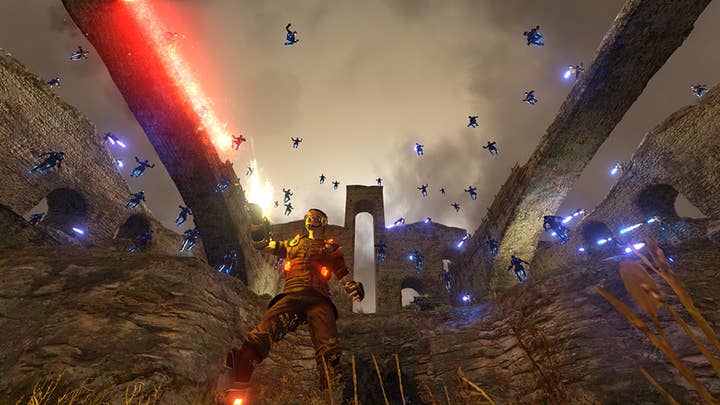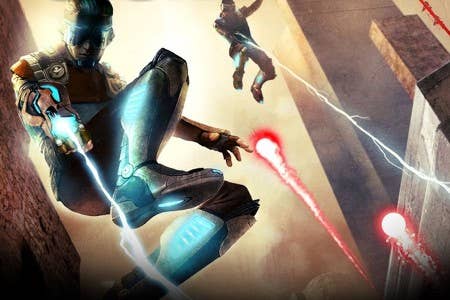Nadeo: ShootMania and the bright future of e-sports
"In the future there will be more people watching video games than playing them"
At Ubisoft's E3 press conference this year, sandwiched between rapturously received demos for Assassin's Creed 3 and Watch Dogs, was Ubisoft's quiet ploy for a toehold in the thriving e-sports scene: ShootMania Storm.
A string of seasoned pro-gamers were brought to the stage to wage war in Nadeo's forthcoming multiplayer shooter, which allows players to create and share their own environments, rule-sets and game modes. ShootMania Storm was custom-built for professional competitive gaming, and E3 was a clear demonstration of its importance to Ubisoft.
"18 months ago we built a new team, Nadeo Live, which is in charge of making sure that the community gets all of the support it needs," says Anne Blondel-Jouin, managing director at Nadeo, the studio behind the do-it-yourself racing series TrackMania.
"I mean, we were between Assassin's Creed 3 and Watch Dogs - that's how important it is to Ubisoft to enter e-sports the right way"
"We were at Ubisoft's E3 conference, and I know a lot of people stared at us and said, 'What are you doing here?' But it was a way for Ubisoft to show that this is important for them. I mean, we were between Assassin's Creed 3 and Watch Dogs - that's how important it is to Ubisoft to enter e-sports the right way."
The broadcasting of live gaming events is one of the key growth areas for the games industry right now, and ShootMania Storm is a prime example of one of its side-effects: games specifically designed to be embraced by the e-sports community. Ultimately, pro-gamers will still hold ultimate power on which game will become the next StarCraft or Counter Strike, but Nadeo is doing everything it can to grab their attention.
"Even if your game is great, it's still up to the players whether it becomes a phenomenon," says Blondel-Jouin. ""Even if you're game is great, it's still up to the players whether it becomes a phenomenon... Other competitors try, but in e-sports it's not up to the publisher or the developer; it's up to the gamers. With ShootMania, we decided that we'll give it a try, so we've been developing it with e-sports in mind."
This ambition is evident in both gameplay and its presentation. Nadeo is synonymous with user-generated content, which is a particularly good fit for the dynamic and demanding pro-gaming scene. The studio has worked closely with pro-gamers to make sure that ShootMania's tool-set provides everything they need and solves a number of existing problems.

However, according to Blondel-Jouin, it's easy to overlook the demands of increasingly popular organisations like Major League Gaming (MLG) and Twitch.tv, which are as concerned with the millions upon millions of spectators as they are with the pro-gamers. For the most part, this translates to a robust and diverse feature-set around real-time stat-tracking, replays and camera angles - "It's like a tennis match, so to speak" - but it also influences content: in short, any game that involves real people and real blood in a realistic setting will encounter significant issues in e-sports, regardless of how the pro-gamers respond.
"We can't go with an 18-rated game," she says. "We're lucky, because PEGI gave us our rating yesterday, and it's 12+, which is a good target for both players and spectators. We don't want kids watching anything too violent, and we don't want parents to feel uncomfortable about anything. In ShootMania, you chase each other but you don't kill; you eliminate each other, so there's no blood, nothing. It's like when you're a kid playing cowboys and indians, only virtually."
"In the future, we have the feeling that there will be more people watching video games than playing them"
Anybody old enough to have played games like Doom and Quake in their pomp will know that an explosion in professional gaming has loomed for quite some time without ever truly happening. In Blondel-Jouin's view, it was always a matter of finding a suitable outlet: in the Nineties, with a relatively narrow amount of space for programming, televising e-sports on a regular basis would have required a tremendous act of faith on the part of TV executives. But in an age of ubiquitous connectivity and rapid video-streaming it's far simpler to satisfy the long-tail of demand for niche areas like professional gaming.
And now that the seal is broken - in terms of both technology and the cultural acceptance of video games - Nadeo and Ubisoft believe that the e-sports scene could become even bigger in the US and Europe than it is in countries like Taiwan and South Korea.
"Technology has had a lot to do with it: the ability for regular players to stream their games and show the world what they are able to do, to share it with friends and fans," says Blondel-Jouin. "Twitch.tv is only a year-old and it's attracting 17 million unique viewers a month. It's unbelievable, but it's thanks to the technology.
"In the future, we have the feeling that there will be more people watching video games than playing them. It's like soccer: you have the great soccer players that everybody watches, and then you play it for fun on a Sunday with your friends."









